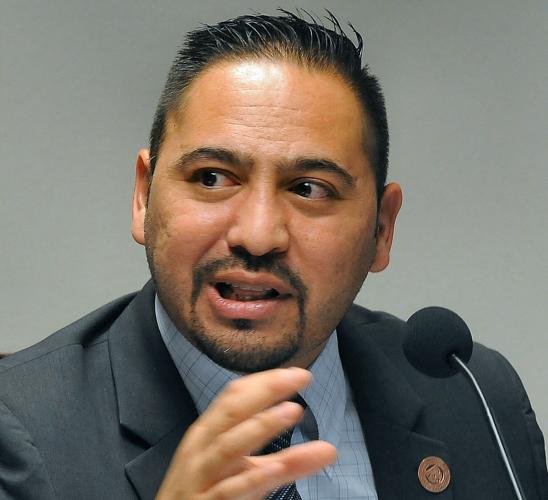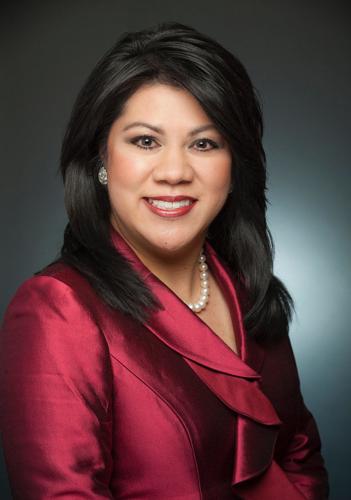The usually dry race for Arizona treasurer has some extra juice this year as conservatives attempt to squeeze out efforts to bring climate concerns into financial decisions.
The incumbent state treasurer, Kimberly Yee, a Republican, has taken a stand against what’s known as “ESG” standards. These are environment, social and governance standards that take into account factors such as a company’s greenhouse gas emissions and vulnerability to the warming climate.
You may have heard them called “woke capitalism.” In the primary election that Yee won, opponent Jeff Weninger’s slogan was “No Woke Investments.”
This is a shorthand some conservatives have taken up to raise the same sort of ruckus about ESG that they successfully raised about another three-letter acronym, CRT, or critical race theory. You may not be surprised to learn they are not completely consistent in their critiques.
Yee’s opponent, state Sen. Martin Quezada, blames the fossil-fuel industry for driving this movement against considering environmental factors in investment and financial decisions.
“They’ve decided to politicize state treasurer offices,” Quezada alleged Tuesday. “They’re trying to create a sort of anti-CRT movement to get people upset.”
Yee and the state investment board passed a new policy Aug. 30 that prohibits the treasurer from considering anything but “pecuniary factors” in making investment decisions. Specifically, it prevents these from consideration:
1. International, domestic, or industry agreements relating to environmental or social goals.
2. Corporate governance structures based on social characteristics.
3. Social or environmental goals.
“They’re putting politics in the investment room,” Yee told me from the road, as she traveled to Bullhead City on Wednesday. “It’s a dangerous path, because you’re dealing with taxpayer dollars.”
Yee and 22 other state financial officers have also signed a letter opposing a proposed SEC rule that would require publicly traded companies to compile and disclose data about their vulnerability to climate change. This would include not just their direct greenhouse gas emissions, but also indirect emissions and vulnerability to increased severe weather, as well as other risk factors.
Yee said by joining these other treasurers she is trying to defend American energy companies and “Push back against this big-government approach.”
When I spoke with him Tuesday, Quezada noted that it’s common these days for individuals and firms to invest in funds with ESG standards.
“Using ESG factors is a common sense financial strategy,” he said. “It’s widely used among individuals involved in the investment of public monies throughout the world. It’s nothing new, it’s nothing radical. It’s simply smart management of money.”
“My interest as state treasurer is to gather all the information I can to create the strongest portfolio I can,” he added. “If it’s a tiebreaking decision, I’m going to make an environmentally conscious decision.”
I asked Nicole Darnall, a foundation professor of management and public policy at ASU, what she thought of the investment board’s new policy of ignoring ESG measures to focus only on “pecuniary” ones. She described it as a false dichotomy.
“In my world, ESG risk is pecuniary,” Darnall said.
For individual companies, that could mean, for example, that they have facilities vulnerable to the rise in sea level, or it could mean they burn a lot of fossil fuels that are vulnerable to increased regulation, or that they use a lot of water in areas expected to have less in the warming climate.
“All ESG is, and ESG reporting, is providing information to the marketplace so that individuals and investors can make decisions that make sense to them,” Darnall said. “By opposing this type of disclosure, you are inhibiting markets from functioning the way they should.”
I appreciate the simplicity in the board of investment’s decision to focus strictly on “pecuniary factors.” But it is probably an oversimplification.
And it is a weird moment to fight financial disclosures related to climate change. The effects of our hotter climate are popping up around the world regularly — record-smashing heat in California, Pakistan underwater from heavy rains and glacial melt, rivers in Europe drying up.
But this is, of course, not an organic movement against considering ESG factors in investments. The conservative American Legislative Exchange Council has been campaigning against efforts by banks and other institiutions to divest from fossil fuel companies.
This year Texas banned financial firms that boycott fossil-fuel companies from doing business with the state or local governments. On Aug. 24, the comptroller released a list of 10 companies and 348 investment funds that can no longer do business with the state because they allegedly boycott fossil-fuel companies.
From her car, Yee brought up the fact that she had divested state money from investments in Unilever, the company that owns the Ben & Jerry’s ice cream brand. She did so, because Ben & Jerry’s announced it planned to no longer sell ice cream in occupied Palestinian territories such as the West Bank.
She argued this violated the state law that bans companies who boycott Israel from doing business with Arizona.
But I see it a different way: This divestment from Unilever seems similar to divestment efforts from companies that violate environmental standards. I asked Yee if this isn’t an ESG-like factor but coming from the political right.
“It’s protecting from discrimination and anti-Semitism,” she responded.
This strikes me, though, as undercutting the case that Yee and the investment board are strictly concerned with “pecuniary factors” in state investments. She didn’t decide to divest from Unilever for financial reasons, after all.
If we can concern ourselves with companies’ decisions on whether to sell ice cream in the West Bank, then surely we can take into account whether a company is helping flood or fry the planet.







